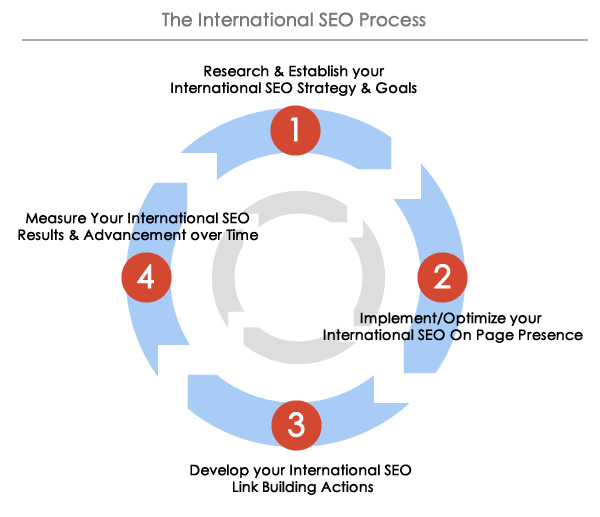Navigating the Digital Landscape: Leveraging International Search Engine Optimization for Cross-Border Success
In today's interconnected digital globe, services are progressively looking past borders to touch into global markets. The complexity of browsing the digital landscape on a global range requires a nuanced approach, from understanding the fundamentals of International SEO to applying geotargeting and multilingual key phrase techniques.
Recognizing International Search Engine Optimization Principles
Navigating the ins and outs of worldwide SEO requires a solid understanding of essential concepts to properly increase on the internet presence across boundaries. One crucial element of international SEO is comprehending the significance of localization. This involves tailoring site content to fit the etymological, cultural, and business differences of target audience. Key words must be not just equated however additionally adapted to show just how individuals in different regions look for details.
Additionally, having a clear understanding of geo-targeting is important. This involves suggesting to internet search engine the details nations or areas a web site is targeting. Implementing hreflang tags is one means to communicate this information, ensuring that the proper version of a website appears in the search results for a customer in a certain location.
Furthermore, understanding the impact of regional internet search engine and social networks platforms is important for global search engine optimization success. As an example, while Google is dominant in many areas, countries like China have their very own online search engine like Baidu, requiring customized methods for each system to make the most of on the internet presence.

Targeting Multilingual Key Words Methods
Creating multilingual key words methods is necessary for successfully reaching varied worldwide target markets and maximizing on-line visibility across various linguistic regions. When targeting multilingual keyword phrase methods, it is crucial to carry out complete study to comprehend the details search terms and expressions made use of by the target market in each etymological region. This includes not only translating search phrases but likewise thinking about cultural subtleties, local dialects, and search fads unique to each target market.
To develop a successful multilingual key words technique, it is essential to prioritize importance and search intent. Keywords ought to straighten with the material on the internet site and resonate with the cultural context of the target market. Making use of devices such as Google Key Words Organizer, SEMrush, or Ahrefs can aid recognize high-performing key phrases in different languages and assess their search quantity and competitors level.
Furthermore, tracking and evaluating the efficiency of multilingual search pop over here phrases on a regular basis is important for enhancing and fine-tuning the strategy with time. By constantly adjusting to changes in search behavior and fads, businesses can boost their on-line visibility and bring in more global traffic to their web sites.
Applying Geotargeting and Hreflang Tags
When aiming to improve international search engine optimization strategies, incorporating geotargeting and hreflang tags is critical for maximizing site presence across different areas. Geotargeting entails customizing content to details areas, ensuring that users in different areas get appropriate details. By applying geotargeting, services can enhance their local search positions and bring in region-specific website traffic.

Optimizing Site Structure for Worldwide Visibility
To additionally improve international SEO methods past geotargeting and hreflang tags, maximizing the website framework is vital for accomplishing international exposure and optimizing reach throughout various regions. A well-structured site not just boosts customer experience but likewise promotes search engine spiders in understanding the content and context of the website.
Furthermore, producing language-specific subdirectories this website or subdomains can assist internet search engine provide the right variation of the internet site to users based upon their language choices, better boosting the general individual experience. Additionally, enhancing URL frameworks to include appropriate key phrases and geotargeted terms can improve the site's visibility in various areas. By structuring the internet site effectively for global audiences, businesses can raise their chances of drawing in international website traffic and expanding their reach throughout boundaries.

Monitoring and Assessing Cross-Border Performance
Effective tracking and studying of cross-border efficiency is important for evaluating the success of international search engine optimization strategies and determining possibilities for enhancement in global reach and exposure. By carefully tracking crucial performance signs (KPIs) throughout different markets, companies can obtain useful insights into the performance of their cross-border SEO efforts. Keeping an eye on metrics such as natural website traffic, keyword rankings, conversion prices, and bounce prices can supply a comprehensive sight of just how well a site is executing in different regions.
Assessing cross-border efficiency information permits services to identify patterns, patterns, and areas for optimization. By comparing efficiency throughout different countries, regions, or languages, business can pinpoint effective approaches and localize content to much better cater to particular target market. Furthermore, keeping an eye on cross-border performance allows companies to stay active and responsive in the ever-evolving electronic landscape. Routine analysis of search engine optimization performance on a global range ensures that business can adjust their approaches rapidly to profit from arising chances and keep an one-upmanship in worldwide markets.
Verdict
In conclusion, worldwide SEO plays a vital duty in achieving cross-border success by maximizing web sites for worldwide visibility, targeting multilingual search phrase methods, implementing geotargeting and hreflang tags, and monitoring cross-border performance. By recognizing the basics of worldwide search engine optimization and enhancing web site structures as necessary, organizations can efficiently get to and engage with This Site their target market throughout different areas and languages. This calculated technique is crucial for broadening market reach and driving online growth in today's electronic landscape.